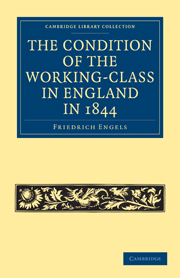
-
Select format
-
- Publisher:
- Cambridge University Press
- Publication date:
- September 2011
- December 2010
- ISBN:
- 9780511792700
- 9781108025607
- Dimensions:
- Weight & Pages:
- Dimensions:
- (216 x 140 mm)
- Weight & Pages:
- 0.42kg, 326 Pages
You may already have access via personal or institutional login
Book description
Frederich Engels (1820–1895) was a German businessman and political theorist renowned as one of the intellectual founders of communism. In 1842 Engels was sent to Manchester to oversee his father's textile business, and he lived in the city until 1844. This volume, first published in German in 1845, contains his classic and highly influential account of working-class life in Manchester at the height of its industrial supremacy. Engels' highly detailed descriptions of urban conditions and contrasts between the different classes in Manchester were informed from both his own observations and his contacts with local labour activists and Chartists. Extensively researched and written with sympathy for the working class, this volume is one Engels' best known works and remains a vivid portrait of contemporary urban England. This volume is reissued from the English edition of 1892, which was translated by noted social activist Florence Kelley Wischnewetzky (1859–1932).
Contents
Metrics
Altmetric attention score
Full text views
Full text views help Loading metrics...
Loading metrics...
* Views captured on Cambridge Core between #date#. This data will be updated every 24 hours.
Usage data cannot currently be displayed.
Accessibility standard: Unknown
Why this information is here
This section outlines the accessibility features of this content - including support for screen readers, full keyboard navigation and high-contrast display options. This may not be relevant for you.
Accessibility Information
Accessibility compliance for the PDF of this book is currently unknown and may be updated in the future.


